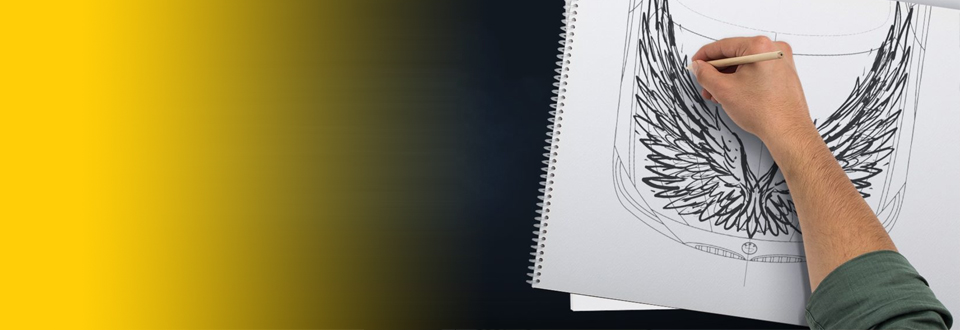
HOW MUCH DOES IT COST TO WRAP A CAR?
Car wrapping is all about creating something that's unique and bespoke as well as beautiful. Additionally, wrap film is a protection for your vehicle's original paintwork. No two car wraps are the same, which makes answering the question 'how much does it cost to wrap a car', pretty challenging.
The total cost depends on the following factors:
The size of the vehicle, the shape of the bodywork, the original colour vs. the new, the specific wrap film you’d like to use (satin, gloss, textured, matte, chrome, reflective or printed), and time of labor costs.
There isn't a standard price tag for a high-quality, professional car wrap. Think of it like commissioning any work of art; the range in price can vary depending on your specifications. To find out the price for your wrap, please CLICK HERE
A fully covered car wrap (full color change) can cost anything from around £1,750 to £5,000
If your car wrapping budget is around £1,500, this can usually be achieved by leaving out door handles, mirrors and even the bumpers and sills. However, the durability and shelf life of the film wrap can also be limited at this price range.
Spending £1,750 – £5,000 on a car wrap takes you into the executive range. Here you can expect car wrapping of the very highest standard, with high attention to detail using the very best vinyl wrap films in the automotive industry, like Avery Dennison, 3M, Oracal, Arlon, Inozetek, Teckwrap, APA or Hexis.
If you’re looking for something roughly in the middle, you can get a very good car wrap for around £2,500 - £3000. Remember that chrome, color flow, exclusive limited colors, textured films or special films are more expensive, than others, what will effect the final costs.
In most cases, car wrapping costs are typically somewhere between these middle-ground and high-end figures. Starting at £1,750 with possible extras of £200 - £600 depending on the vehicle and wrap film used, you're going to end up with an extremely well-wrapped car. This potential car wrap cost generally includes all used materials, facility hire, surface preparation, tool stocking, after care and labor costs as well. There would also be a strict quality assessment and a final clean before you receive the completed vehicle.
Feel free to contact us, before making any decisions. We will be able to offer you FREE advice and a relatively accurate quote, based on your personal needs and desired outcomes. CLICK HERE TO CONTACT US.
With motorbikes there can be a larger variation in price than with other vehicles, as although we use much less vinyl, some manufacturers' styling can significantly increase the time it takes to apply the wrap film. A standard fairing, mudguards, seat surround and side panels in a standard colour vinyl wrap can costs around £250 – £800.
Specifics that affect the price
No two car wraps are the same as every vehicle on the road will be in a different condition, consider the following points:
- The size of the vehicle – in general, a small car such as a Ford Ka or a Smart will be cheaper than a huge Mercedes Benz SUV.
- The complexity of the vehicle surface – even small cars can have lots of curves, lines, recessed areas, grooves and other complex design features that increase the time of installation.
- The condition of the existing paintwork – vinyl will not adhere to rust and any existing dents or deep scratches on the surface of the vehicle will still be visible through the new wrap. In a scenario, where the bodywork is not decent, we might send the vehicle to a bodyshop, to fix imperfections.
- Aftermarket parts fitted – any aftermarket sills, spoilers, skirts, bumpers or other aftermarket parts will increase the time of installation.
- Any existing vinyl or graphics fitted – a new vinyl wrap can only adhere to paintwork in good condition, any existing graphics or vinyl will need to be removed.
- The type of vinyl wrapped on the car – the cheapest vinyl is an off-the-shelf solid colour. Chrome, satins and three-tone colours cost more with custom-designed patterns costing considerably more.
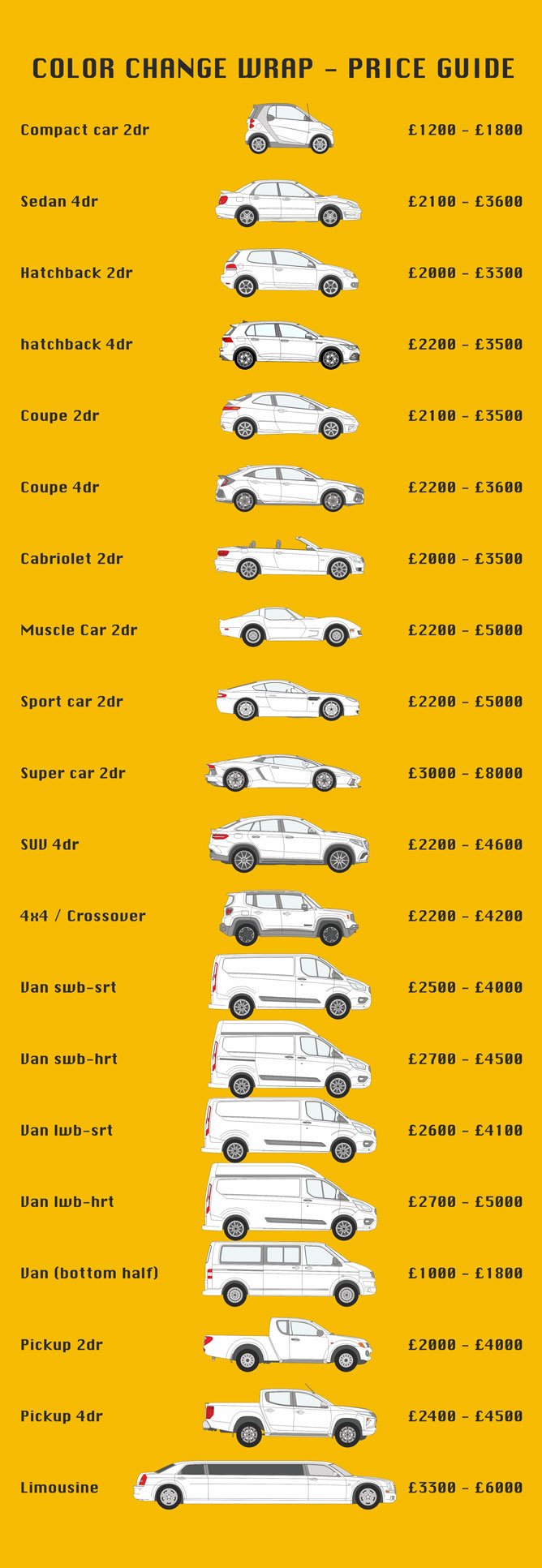

WHAT FACTORS EFFECT THE FINAL COST OF A CAR WRAP?
1. Size and Type of Vehicle
The larger the vehicle, the more material and labour will be required to complete the job. Additionally, the shape and curves of the vehicle can also affect the cost. Vehicles with complex curves and angles may require additional effort and time to wrap, resulting in higher costs. SUVs, vans, and trucks tend to be more expensive to wrap than smaller cars.
2. Quality and Type of Vinyl Wrap Film
The quality and type of vinyl used also affect the car wrap cost. High-quality vinyl materials tend to be more expensive but offer better durability and longevity. There are also different types of vinyl finishes, such as matte, gloss, ultra gloss, chrome and satin, which can also affect the cost.
3. Design Complexity (for commercial wraps)
The design and complexity of the wrap will also impact the cost. Simple designs with basic graphics and logos will be less expensive than complex designs with multiple colours, patterns, and intricate details. The more complex the design, the more time and effort will be required to install the wrap, resulting in higher costs.
4. Installation Costs
Installation costs are another factor that can affect the car wrap cost. The installation process requires skill and expertise. Installation costs may vary depending on the size and shape of the actual vehicle.
Investing in a High-Quality Car Wrap
It is essential to note that the car wrap cost is a long-term investment. A high-quality wrap can last up to four years or more, depending on the quality of the vinyl and how well it is maintained. Therefore, you should view the car wrap cost as a long-term investment that can provide numerous benefits, such as protecting your car’s paint from UV rays and other environmental factors, enhancing your vehicle’s appearance, and serving as a mobile billboard for your business or brand.
When considering the car wrap cost, it is essential to keep in mind that the cheapest option may not always be the best. While it may be tempting to go for the lowest price, you may end up sacrificing quality and durability. Therefore, it is crucial to use high-quality materials.
In conclusion, the car wrap cost depends on several factors, such as the type and size of the vehicle, the quality of vinyl used, the complexity of the design, and the installation costs.
Investing in a high-quality car wrap can provide numerous benefits, such as protection for your car’s paint and a unique way to showcase your personal style or promote your business. It is important to carefully consider the cost and weigh it against the long-term benefits of having a car wrap.
WHAT ARE THE BENEFITS / ADVANTAGES OF CAR WRAPPING?
1. Marketing Your Business
One of the significant advantages of having a car wrap is that it is an effective marketing tool. If you are a business owner, wrapping your car with your company’s logo and contact information is an excellent way to advertise your brand to a large audience. As your vehicle drives around, it serves as a mobile billboard, promoting your business to potential customers.
2. Protecting Your Vehicle’s Paint
Another benefit of car wrapping is that it can protect your vehicle’s paint from various environmental factors, such as UV rays, dirt, and scratches. Vinyl wraps act as a barrier, preventing damage to the original paint of the car. Additionally, vinyl wraps are easy to remove, and they leave no residue, making them a temporary and safe option for protecting your vehicle’s paint.
3. Expressing Your Personality and Style
Car wraps also offer an opportunity for car owners to express their personality and style through their vehicles. With the various vinyl finishes available, such as matte, gloss, super gloss, chrome, satin chrome, metallics and satin, you can customize your car to match your unique style. Additionally, the design possibilities are endless, allowing you to create a one-of-a-kind look for your car.
When deciding to invest in a car wrap, it is crucial to choose a reputable car wrapping film manufacturer brand, such as Avery Dennison, 3M, Oracal, Inozetek, Teckwrap, Hexis, APA, etc.
Conclusion: Weighing the Costs against the Benefits
In summary, the car wap cost varies depending on several factors, such as the size and type of the vehicle, the quality of the vinyl used, the complexity of the design, and the installation costs. While the initial cost may seem high, investing in a high-quality car wrap is a long-term investment that can provide numerous benefits, such as protection for your vehicle’s paint, effective advertising for your business, and an opportunity to showcase your personality and style. For an example, before you sell your car in the future, you can remove the wrap, and sell it with a mint condition paintjob on it, with no scratch marks, swirl marks, fadings, water spots, bird dropping acid marks, water or fuel damages, etc. so your buyer can not negotiate on the condition of the paintjob, means you can sell your used vehicle for a higher price.
HOW IS THE VEHICLE WRAPPING PROCESS?
Firstly we give you a form what you need to complete with your details, the details of the vehicle or fleet, and the details of the job.
Before the vehicle is wrapped or undergoes any vehicle graphics or livery, it is cleaned very carefully using special vinyl manufacturer-approved surface preparation products. The cleaning process is the most important part of the job as this ensures the elimination of any wax, dust, ceramic coatings, oils or residues which can cause film pullback.
After the cleaning (preparation) process, we disassemble parts such as grills, door handles or headlights to achieve additional space to tuck in the cast film properly into deep recessed areas. Before the vinyl application begins, the workshop area is cleaned and heated to the optimal temperature, and then we clean the vehicle's surface once more as a necessity.
We have a strict process in place that our professional technicians adhere to for all of our vehicle wrapping. This ensures an optimum finish and an increased longevity of the wrap.
The technicians sign the quality control sheet as they complete each section of the car or vehicle, so we keep a log of who did what, how long it took, the type of film used and if there were any issues with the application.
Some vinyls contain small beads of adhesive which allow it to be re-positioned being applied on the vehicle panels. When pressure is applied by the specialist tools, the beads break and the adhesive spreads. Once the vehicle has been fully wrapped, the vinyl is heated to a temperature specific for the type of vinyl being applied (usually in-between 80 and 120 Celsius) which then fully activates the adhesive and removes any scratches on the film caused by the squeegee during the application process. The exterior parts are then refitted to the vehicle and it is left overnight for the vinyl to properly adhere. Finally the quality controller checks each area that has been wrapped and countersigns the quality control sheet, before referring to the check-in form. He uses this to complete the handover form after which the vehicle is then ready for collection by the no doubt rather excited owner!
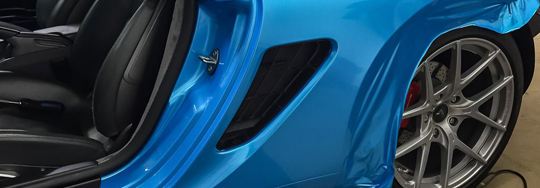
DOES WRAPPING DAMAGE THE PAINTWORK?
No. Using a vinyl that has been specifically made for automotive use (cast or hybrid cast calendered vinyl films) does not damage your paintwork when it is applied, or when it is removed professionally under 5-11 years. Full vehicle wraps or vinyl graphics and liveries are a much better choice for your car, van or commercial vehicle than traditional sign writing in terms of value for money. This type of livery actually protects your vehicle's bodywork and its original paintwork while shielding the paint against chips, abrasions and weathering to preserve your car's future value.
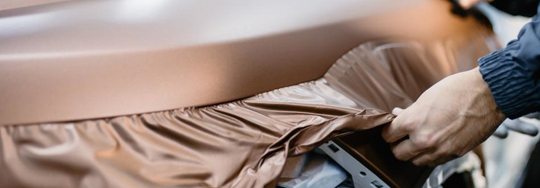
WHO DO I NEED TO ADVISE ABOUT MY VEHICLE WRAP?
One of the most common question when it comes to car wraps, is who you are legally required to notify.
First contact your insurance company. It is important that you advise your insurance company that you have had your vehicle partially or fully wrapped. This way should you be in the unfortunate position of having an accident or need to claim on your insurance company, then they are aware of the costs and materials that will need to be replaced.
Also if you had your car wrapped in to a different colour, (full colour change) you need to request a new logbook, (report the modification is required to the Vehicle Licensing Centre) to avoid any kind of prosecution or issues with the Police, even if it is just a temporary wrap. The good thing is, that it is free in the Isle of Man, you can do it in any post office or even online.
- To help you out with the form, you can download it from HERE
What about the DVLA?
From their perspective, the police and other law enforcement agencies rely on the DVLA to provide accurate information / descriptions for vehicles during an investigation. This includes information's like make, model, and colour. If your motor gets stolen, for example, the DVLA will use the information on file to send out a police alert. If your car is technically blue, but it’s fully covered with an black wrap for an example, it would be much more effective to have this information on file rather than sending out a report with a blue description. That is why you need to report the colour change.
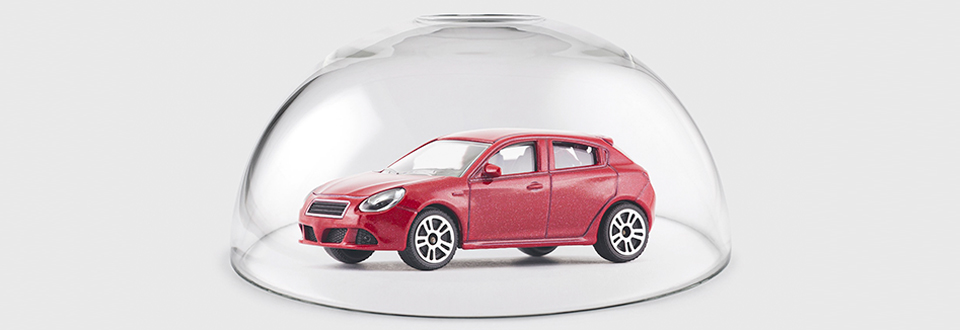
CAN VINYL WRAPS BE REMOVED?
Yes. Our vinyl wraps and vehicle graphics can be removed, providing the correct techniques and equipment are used by a professional installer. You may wish to do this if you are selling your vehicle or returning it to the leasing company. You may want to change the colour of your car or commercial vehicle, or even update it to your latest advertising campaign with printed vinyl graphics.

IS MY DEPOSIT REFUNDABLE?
If you have booked a vehicle in and paid a deposit for wrapping, we are afraid that we are unable to refund your deposit.

HOW DO I CLEAN MY WRAPPED VEHICLE?
Extra care should be taken when cleaning your wrap, meaning you need to forget high pressure washer machines, other machine cleaning tools, hard brushes and chemicals if you want your wrap stay in mint condition in long term without any discoloration. You will receive a detailed aftercare guide upon vehicle collection.
It is worth keeping in mind that matte and structured wrap films require more care than glossy, matte or satin films, as the roughness and structures allow fine dust to settle more easily. Cleaning these surfaces also takes longer. We are able to supply specialized cleaning products (PH neutral), wrap care products and coating solutions, such as water repellent ceramic coating specially designed for automotive wrap films.

HOW DO I PROTECT MY VINYL WRAP?
The biggest threat to premature wear on vinyl products whether it be a full car wrap or just smaller decals, is exposure to UV rays, contaminants and harsh chemical cleaners. In order to protect your vehicle wraps, there are two ways to accomplish this; You can keep the vehicle indoors, or you can apply a semi-permanent layer of protection that is engineered to protect against the items listed above.
One of the best solution is flexible ceramic coating specially designed for automotive vinyl films.
A nano-ceramic coating is comprised of SiO2 or silica dioxide. It's basically liquid quartz, meaning that once it cures it’s exceptionally hard. This product works on any solid and porous material, including clear coats of paint, wheels, glass, carbon fiber, and of course cast vinyl and PPF films. Depending on what type of nano-ceramic coating product you use, longevity can be increased up to 7-12 months. When the coating is applied it penetrates the microscopic peaks and valleys found in all porous materials. It then layers on top of the surface and creates an exceptionally strong layer of protection. It protects the surface underneath against direct exposure to materials and environmental threats that accelerate damage to the wrap film. It can also be used on clear paint protection film (PPF). When the coating cures, it makes the surface incredibly hydrophobic which means that bird droppings, insects, and tree sap are far easier to remove.
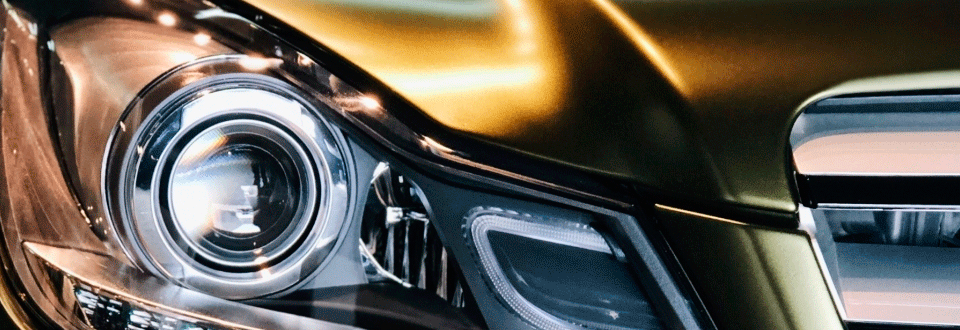
HOW OFTEN SHOULD I WASH MY WRAPPED VEHICLE?
Generally, a vehicle wrap or vinyl graphics should be washed on a weekly or bi-weekly basis. The goal of any car wash is to remove pollutants, contaminants, or debris that damage the vinyl material. Washing a vinyl wrap frequently can accelerate the breakdown of glossiness of the surface however, the most important thing to remember is how and what car wash soap to use. The best car wash products to use are those that are pH neutral, do not contain wax or any other 'protective' agents. If you use non-recommended chemical compounds they can modify, discolourate, blur or destroy the glossiness of the cast film.
If you're going to apply protective products on top of a vinyl wrap, do it the correct way. Additionally if you use random, non-recommended chemicals or soaps, you automatically void any kind of guarantees.
The reliable 'two-bucket' method of car washing is your best bet for washing a car wrap. This ensures that you remove the dirt, debris, and impurities on the wrap without damaging it by using automatic machines or pressure washers.
Regarding the latter point, don’t bring your car to an automated brush-less car wash. I mean, you can do it, but why would you risk the damage? Brushes – like those in the automatic car washing facilities are an absolute no-go!
You should also avoid using high-pressure hoses to wash or rinse the wrap. Again, some high-pressure systems are OK to use but it mainly depends on the pressure used. If you're going to use a pressure washer, make sure to ask your vinyl wrap manufacturer what PSI the system should be set at, otherwise you can cause comebacks or damages on the film.

HOW SHOULD A CAR WRAP BE WASHED?
The reliable 'two-bucket' method of car washing is your best bet for washing a car wrap. This ensures that you remove the dirt, debris, and impurities on the wrap without damaging it by using automatic machines or pressure washers.
Regarding the latter point, don’t bring your car to an automated brushless car wash. I mean, you can do it, but why would you risk the damage? Brushes – like those in the automatic car washing facilities are an absolute no-go!
WHAT TO USE TO SPOT CLEANING A WRAP?
We recommend using water-less wash products or hot soapy water. However, you can use isopropyl alcohol that is diluted with distilled water. There are some recommended steps for using any spot cleaning product on a car vinyl wrap. First, never use on warm surfaces! Spraying a cleaner on warm vinyl decals can cause some damage to the wrap. We recommend using spray cleaners on cool to the touch vinyl materials, in the shade, or inside a garage – again, only once the surface has cooled down.
You should also avoid using high-pressure hoses to wash or rinse the wrap. Again, some high-pressure systems are OK to use but it mainly depends on the pressure used. If you're going to use a pressure washer, make sure to ask your vinyl wrap manufacturer what PSI the system should be set at, otherwise you can cause comebacks or damages on the film.
WHAT HAPPENS WHEN YOU SPILL FUEL, GASOLINE OR OIL ON A VINYL WRAP?
Anytime gasoline or oil is spilled onto a surface, damage can occur. Gasoline specifically, is a high-percentage solvent which can damage soft materials like partial wraps or vinyl car wraps. As such, it is recommended to wipe off gasoline spills or oil spills immediately. It's always a good idea to hand wash the entire area, using the two-bucket method of car washing. Gasoline and oils can cause staining to vinyl. So if you spill gasoline on a wrap, grab a wet paper towel and wipe the area with lots of water. Once you get home, hand washing that section is highly recommended.
CAN YOU TINT HEADLIGHTS?
Yes, we do, pop in to our workshop to chose from different headlight cast films. We have different options in colours and brands.
To book your appointment, please CLICK HERE
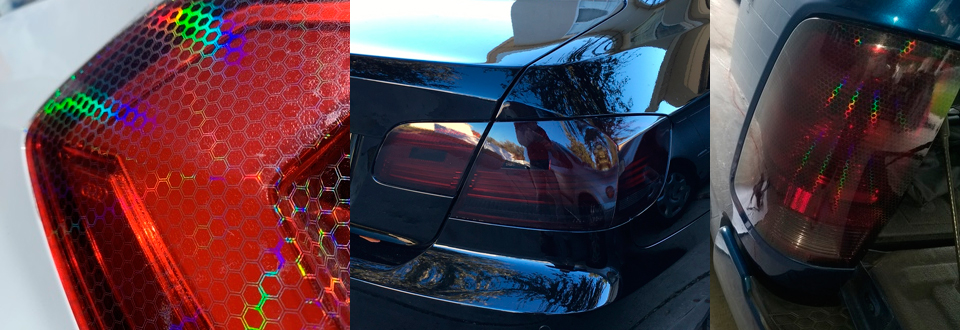
DO YOU DO WINDOW TINTING?
At the moment we don't do window tinting, but doing full or partial colour change wraps.
HOW LONG DOES A WRAP LAST?
After professional application and with good maintenance, a wrap can last about 1 - 7 years without fading or deteriorating depending on the type of film used. Don't forget that, the maximum lifespan depends on how you look after your wrap
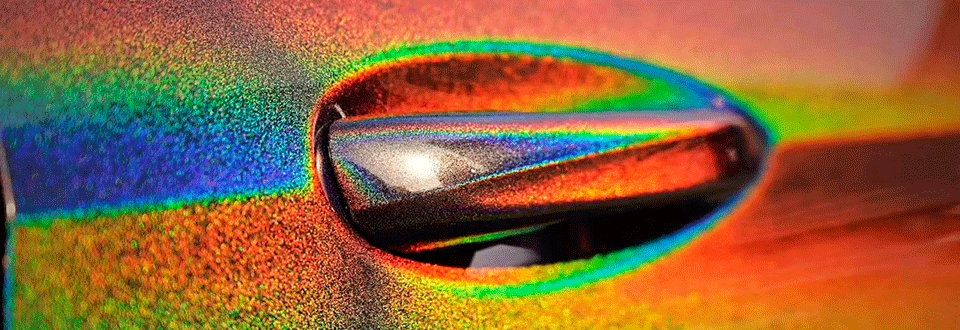
WHAT BRAND OF FILMS ARE YOU USING, DO YOU HAVE ANY SAMPLES?
We use mostly Avery Dennison, Hexis, VViViD, 3M, Oracal, Arlon, Inozetek and Teckwrap cast, hybrid cast calendered and calendered films.
Please CLICK HERE to book your appointment, so we can show you samples, to help you choose the right colour
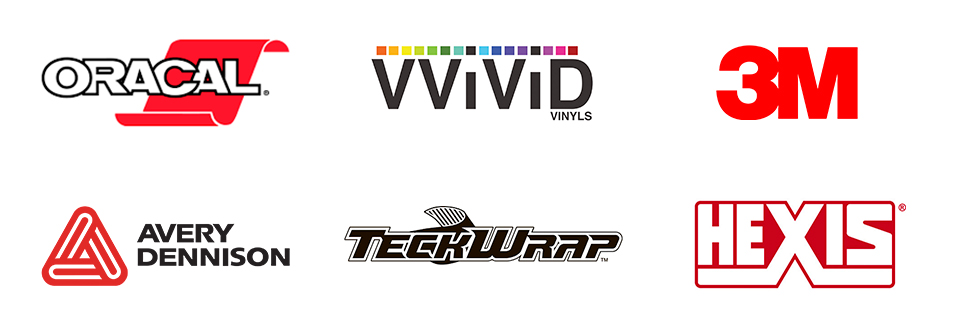
DO YOU GIVE A GUARANTEE?
We only give full guarantee for the wrap job, if your vehicle's paintjob is OEM, original, mint, or near mint condition and it has never been partially resprayed or retouched elsewhere. The reasoning behind this, is that if there is a poor quality paint, cheap clear coat over the paint, then the vinyl wrap film can strip the tatty, peeled off oldschool clear coat - not just when we apply it, but when it is removed at some point in the future. We simply don't want a bad quality vehicle body to jeopardise the quality of our work and reputation.
Having said that, guarantees of up to 1 - 7 years are available on our colour change wraps depending on the film used.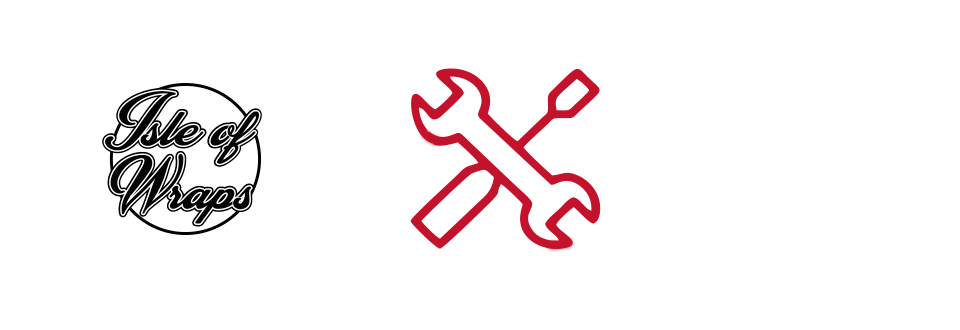
CAN I CHOOSE TO PARTIALLY WRAP MY VEHICLE?
Vehicle wrapping is most effective when the whole vehicle is covered in a complete design, but you can chose to wrap just part of the vehicle, such as the bonnet or side panels, the roof, spoilers, chrome bits or mirrors etc. We also do racing stripes, commercial wraps, sign writing, etc.
CAN YOU APPLY FLUORESCENT OR REFLECTIVE WRAP FILMS?
Here at Isle of Wraps we are proud to offer a wide array of different types of automotive cast films. From matte, metallic, satin or chrome to textured, 3d carbon fiber effects, we aim to reach the toughest expectations. With this very special fact in mind we also offer a wide range of fluorescent and reflective vehicle wraps for both commercial and private vehicles.
The vast majority of time it is trucks and fleets that require special reflective or fluorescent wraps and decals. Fluorescent vinyl means that vans and trucks can be seen in difficult conditions including during twilight hours and poor visibility. (Emergency vehicles, security vehicles, fire trucks, heavy weight industrial vehicles, trucks, excavators, life boats, etc.) Like our other cast vinyl wrap films, fluorescent wraps can last up to 1 - 3 years when properly looked after. We provide water repellent hydrophobic solutions and after care tips, to help reach the maximum life-spam of the reflective cast film.
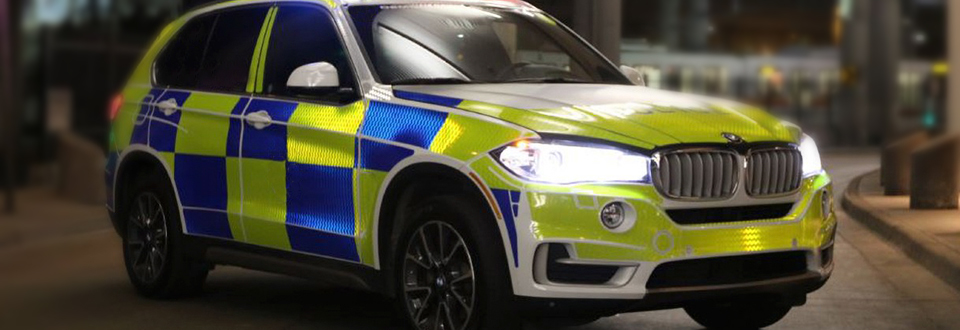
ARE YOU INSURED?
We are insured to work on vehicles to a value of £200,000. We are insured against negligence whilst wrapping your car and have public employee liability insurance.

HOW LONG DOES IT TAKE TO WRAP A BASIC CAR, ONCE THE DESIGN IS APPROVED?
A full wrap is usually completed within approx 3-7 working days, depending on the shape of the vehicle, the cast film we are using and the optional extra bits, like inner door bits, door jams, interior bits, door handles, extra spoilers etc.
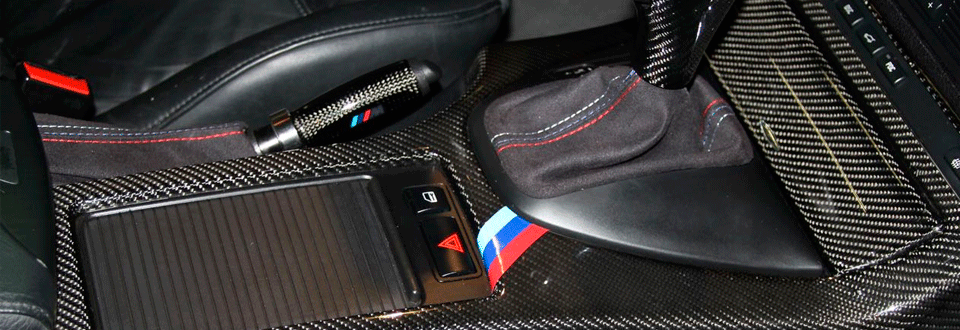
YOU GAVE ME A QUOTE. HOW LONG IS IT VALID?
All quotations are valid for 14 days, with no exceptions.

CAN YOU APPLY A WRAP DESIGN MADE BY SOMEONE ELSE?
Yes, we can, however keep in mind, that reproduction in any form, of copyrighted materials without prior permission of the originator is illegal. It is the responsibility of the Client to obtain said permission. Isle of Wraps is in no way responsible for obtaining permission and assumes that the Client has obtained permission before the work is submitted.
